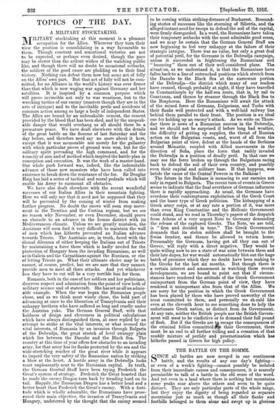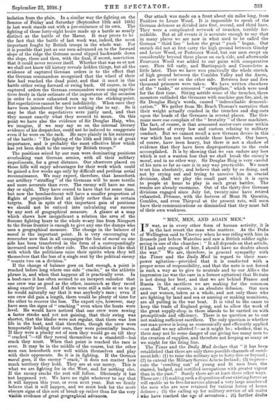THE BATTLE ON THE SOMME.
SINCE all battles are now merged in one continuous battle, and the results of any one day's fighting— or even of a week's fighting—cannot possibly be isolated from their immediate causes and consequences, it is scarcely permissible to talk of a battle in the old sense of the word. And yet even in a land where there is nothing but mountains some peaks soar above the others and seem to be quite distinct. They are only particular parts of the whole range, but they en joy the dignity of being regarded as separate mountains just as much as though all their flanks and foothills belonged to them alone and swept up in glorious isolation from the plain. In a similar way the fighting on the Somme of Friday and Saturday (September 15th and 16th) in last week stands out with a pre-eminence of its own. The fighting of those forty-eight hours made up a battle as nearly distinct as the battle of the Marne. It may prove to bs the fact that the battle of last week was, indeed, the most important fought by British troops in the whole war. For it is possible that just as our men advanced on to the forward slope of the ridge the German moral slipped backwards down the slope, there and then, with the final, if secret, conviction that it could never recover itself. Whether that was so or not we shall not know till history reveals hidden things, but all the evidence of captured German orders is to the effect that the German commanders recognized that the wheel of their fate had reached the dead point, and that it must in this battle either swing forward or swing back. Of course, in the captured orders the German commanders were using superla- tives freely in their estimate of the importance of the occasion in order to screw exhausted men up to the sticking-point. But superlatives cannot be used indefinitely. When once they have been introduced they leave nothing else to say. So it may be that the superlatives were justly used, and that they meant exactly what they seemed to mean. On this point we have also the evidence of Sir Douglas Haig, who, we imagine, if we may say so on the internal literary evidence of his despatches, could not be induced to exaggerate even if he were on the rack. He says plainly in his summary of the battle : " The fighting of the 15th and 16th is of great importance, and is probably the most effective blow which has yet been dealt to the enemy by British troops."
The positions seized by our men were dominating positions overlooking vast German armies, with all their military impedimenta, for a great distance. Our observers placed on those hills will enjoy advantages for their work which could be gained a few weeks ago only by difficult and perilous aerial reconnaissance. We may expect, therefore, that henceforth our artillery "straffing " of the Germans will be more terrific and more accurate than ever. The enemy will have no rest day or night. They have ceased to have that for some time, but now the bombardment will have a smaller proportion of flights of projectiles fired at likely rather than at certain targets. But in spite of this important gain of positions we should not be enticed into calculating our success by any sort of geographical measure. A glance at a map which shows how insignificant a relation the area of the Somme fighting bears to the whole weary line from Nieuport to the Swiss frontier is enough to give any one the dumps who uses a geographical measure. The change in the balance of moral is the important point. It is very encouraging to remember now that in all campaigns the loss of moral on one side has been transferred in the form of a correspondingly increased moral to the other side. The calculation is like that with which the politicians raise their spirits when they tell themselves that the loss of a single seat by the political enemy " counts two on a division."
If the change of balance goes on fast enough, a point is reached before long where one side " cracks," as the athletic phrase is, and when that happens all is practically over. In a boat-race it has often seemed to an inexpert onlooker that one crew was as good- as the other, inasmuch as they raced along exactly level. And if there were still a mile or so to go he would naturally say that it was anybody's race ; even if one crew did gain a length, there would be plenty of time for the other to recover the loss. The expert eye, however, may have seen the signs of " cracking " even when the boats were leveL He would have noticed that one crew were rowing a faster stroke and yet not gaining, that their swing was shorter, that the blades were not regular, that there was less life in the boat, and that therefore, though the crew were temporarily holding their own, they were potentially beaten. If they were a plucky set of men they would go on till they " cracked "—till they rowed themselves to a standstill—but crack they must. When that point is reached the race is over. It may be in the middle of the course, but the other men can henceforth row well within themselves and play with their opponents. So it is in fighting. If the German moral goes, if the enemy " crack," it does not matter how much territory they hold. They are at our mercy. This is what we are fighting for in the West, and for nothing else. If the enemy cracks the rest will follow. Obviously it has mot happened yet. We have no right whatever to say that it will happen this year, or even next year. But we firmly believe that it will happen, and we must look for the more obscure signs of this sort of break-up rather than for the very sfulible evidence of great geographical advances. Our attack was made on a front about six miles long, from Pozieres to Leuze Wood. It is impossible to speak of the German defences as divided into first, second, and third lines. They were a complicated network of trenches, terribly for- midable. But at all events it is accurate enough to say that in many places we are now in what used to be called the German " third line " before the great " push " began. Our onrush did not at first carry the high ground between Ginchy and Leuze Wood, or Fottreaux Wood, but our men swept on considerably beyond these places on each side, and afterwards Foureaux Wood was added to our gains with comparative ease. Flers fell early, and Martinpuich and Courcelette a little later. Thus we have won practically the whole stretch of high ground between the Comblea Valley and the Ancre, and are well over on the other side. Between four and five thousand prisoners were taken. We have written elsewhere of the " tanks," or armoured " caterpillars," which were used for the first time. Sitting astride some of the trenches, these monsters enfiladed the Germans with machine-gun fire, and, in Sir Douglas Haig's words, caused " indescribable demorali- zation." We gather from Mr. Beach Thomas's narrative that their weight actually crushed in the trenches and dug-outs upon the heads of the Germans in several places. The Ger- mans more suo complain of the " brutality " of these machines. The fact, of course, is that armoured motor-cars come within the borders of every law and custom relating to military conduct. But we cannot recall a new German device in this war which has not been outside those borders. Our losses, of course, have been heavy, but there is not a shadow of evidence that they have been disproportionate to the ends accomplished. It is by showing that we can endure any loss which is not a wanton loss that we shall break the enemy's moral, and in no other way. Sir Douglas Haig is very careful of his men so far as care is in any way practicable. We must trust him absolutely, and believe that only by so doing, and not by crying out and trying to unnerve him in crucial decisions, shall we play the small part which it is open to people at home to play in such great battles. The results are already enormous. Out of the thirty-five German divisions engaged since July 1st, twenty-nine have retired exhausted. Phonne, with the fortress of Mont St Quentin, Combles, and even Thiepval at the present rate, will soon have their communications so diminished that they must fall of their own weakness.



































 Previous page
Previous page